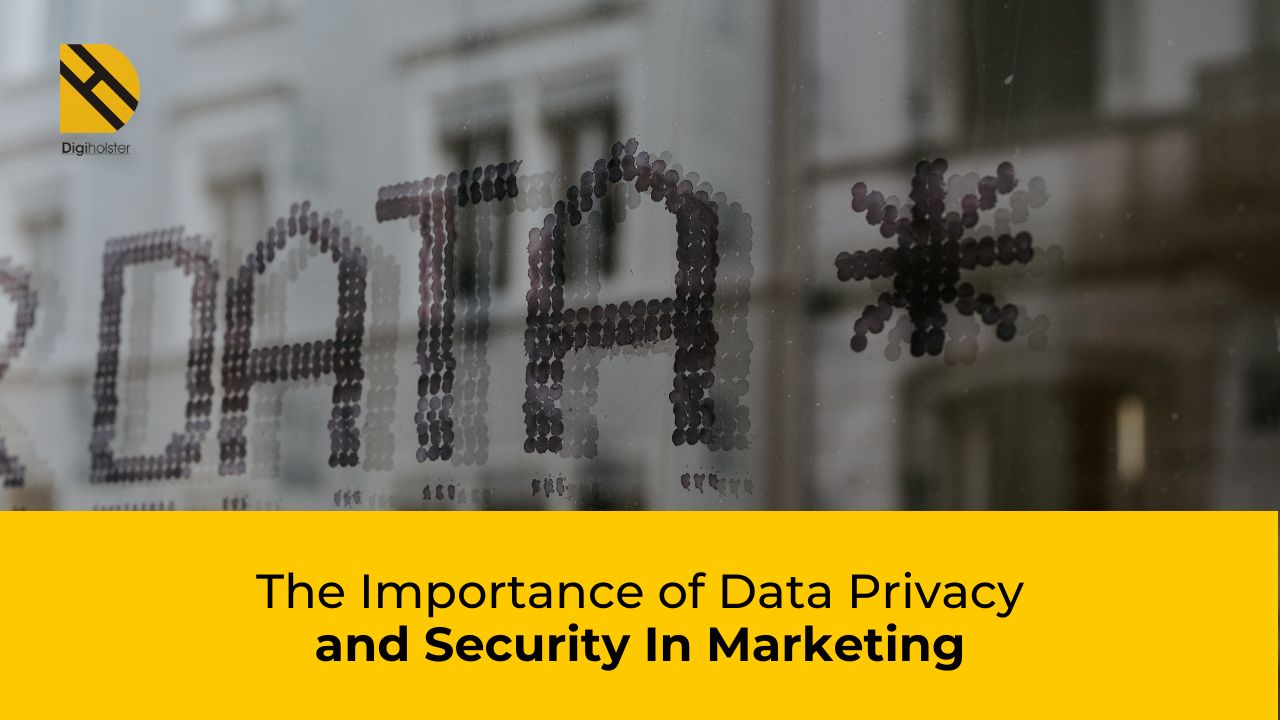
The Importance of Data Privacy and Security In Marketing is a broad topic but we will try to cover it in this article. As the digital age continues to evolve and expand, the collection and use of personal data have become central to many businesses’ marketing strategies. However, with the increasing amount of sensitive information being shared and stored online, it is crucial that companies take the necessary steps to protect their customers’ data privacy and security.
What is Data Privacy?
Data privacy refers to the right of individuals to control who has access to their personal information and how it is used. This includes information such as name, address, social security number, and financial information. The concept of data privacy has become even more important in the digital age as technology has made it easier for companies to collect and store large amounts of personal information.
Why is Data Privacy Important in Marketing?
Marketing efforts rely heavily on the collection and analysis of personal data, including demographic information and purchasing habits. While this information can be incredibly useful for targeted advertising and personalized promotions, it also leaves customers vulnerable to privacy violations and the misuse of their personal information. In order to build and maintain customer trust, companies must prioritize data privacy in their marketing strategies.
What is Data Security?
Data security refers to the measures taken to protect sensitive information from unauthorized access, modification, or destruction. This includes practices such as encryption, regular backups, and strict access controls. In the marketing industry, data security is critical in protecting both customers and companies from potential financial and reputational harm.
Data Privacy Law
Data privacy laws refer to a set of regulations that govern the collection, use, storage, and dissemination of personal information. The aim of these laws is to protect individuals’ privacy rights and ensure that their personal information is collected, used, and shared in a responsible and ethical manner.
There are various data privacy laws around the world, but the most well-known is the European Union’s General Data Protection Regulation (GDPR). The GDPR sets out strict rules for how organizations must handle personal data, including obtaining clear and informed consent, providing data protection rights, and adhering to data protection principles.
In the United States, there is no federal data privacy law that applies to all organizations. However, certain industries, such as healthcare and finance, have their own sector-specific regulations, such as the Health Insurance Portability and Accountability Act (HIPAA) and the Gramm-Leach-Bliley Act (GLBA).
It’s important for organizations to be aware of and comply with the data privacy laws that apply to them, as non-compliance can result in significant financial penalties and reputational damage.

Data Breaching In Marketing
Data breaches in marketing can have serious consequences, both for the individuals whose personal information has been compromised and for the organizations responsible for safeguarding that information.
When a marketing organization experiences a data breach, sensitive information such as names, addresses, phone numbers, email addresses, and even financial information can be stolen or misused by unauthorized individuals. This can lead to identity theft, financial fraud, and other types of harm to the affected individuals.
Moreover, a data breach can damage the reputation of the marketing organization and undermine public trust. Consumers may be less likely to do business with the organization in the future and may view it as untrustworthy or irresponsible with their personal information.
To prevent data breaches in marketing, organizations should take steps to secure their systems and networks, implement strong password policies, regularly update their software, and train employees on best practices for data security. They should also have an incident response plan in place to quickly and effectively respond to a breach if it occurs.
Additionally, organizations should regularly review and assess their data privacy policies and procedures to ensure that they are in compliance with applicable laws and regulations. This can help to minimize the risk of a data breach and demonstrate the organization’s commitment to data privacy and security.
GDPR and Marketing
The General Data Protection Regulation (GDPR) has a significant impact on marketing practices, particularly in the European Union (EU). The GDPR sets strict rules for how organizations can collect, use, and store personal data, with the aim of protecting individuals’ privacy rights.
Under the GDPR, organizations must obtain clear and informed consent from individuals before collecting, using, or storing their personal data for marketing purposes. This means that individuals must be told what data is being collected, why it’s being collected, and how it will be used. They must also have the option to opt-out of marketing communications.
The GDPR also requires organizations to implement appropriate technical and organizational measures to ensure the security of personal data, including regular data protection impact assessments, secure data storage, and incident response plans.
In addition, the GDPR gives individuals certain rights in relation to their personal data, including the right to access, rectify, and erase their data. Organizations must be able to respond to these requests in a timely and effective manner.
In order to comply with the GDPR, marketing organizations should review and assess their data privacy policies and procedures, update their marketing communications to ensure they are GDPR-compliant, and train their employees on the GDPR and best practices for data privacy.
Overall, the GDPR represents a significant shift in the way organizations can collect and use personal data for marketing purposes. However, by adopting best practices for data privacy and security, marketing organizations can ensure that they are able to continue reaching and engaging with their target audiences in a responsible and ethical manner.
Marketing Data Privacy and Security Solutions
There are various solutions available to help marketing organizations ensure the privacy and security of personal data. Some of the key solutions include:
- Data Encryption: Encrypting sensitive data, such as credit card numbers and personal information, can help prevent unauthorized access or misuse of the data.
- Data Management Software: Data management software can help organizations securely store and manage personal data, including tracking who has access to the data, when it was accessed, and for what purpose.
- Firewalls and Antivirus Software: Firewalls and antivirus software can help prevent unauthorized access to networks and systems, and protect against malicious software, such as viruses and malware.
- Access Controls: Implementing strong access controls, such as passwords and multi-factor authentication, can help prevent unauthorized access to sensitive data.
- Incident Response Plans: Having a well-documented and tested incident response plan in place can help organizations quickly and effectively respond to a data breach or security incident.
- Data Privacy Impact Assessments: Regular data privacy impact assessments can help organizations identify potential risks to personal data and take steps to mitigate those risks.
- Employee Training: Regular employee training on data privacy and security best practices can help raise awareness and ensure that all employees understand their role in protecting personal data.
By implementing these solutions, marketing organizations can enhance their privacy and security measures and ensure that they are complying with data privacy laws, such as the GDPR. It’s important for organizations to regularly review and assess their data privacy and security measures to ensure they are staying up-to-date with the latest best practices and developments in the field.

Marketing Data Privacy and Security Consultants
Marketing data privacy and security consultants are professionals who specialize in helping organizations ensure the privacy and security of personal data used for marketing purposes. They can provide a range of services, including:
- Data Privacy and Security Audits: A data privacy and security audit can help organizations identify potential risks to personal data and determine what steps need to be taken to mitigate those risks.
- Compliance with Data Privacy Laws: Consultants can help organizations understand and comply with relevant data privacy laws, such as the General Data Protection Regulation (GDPR) in the European Union (EU) or the California Consumer Privacy Act (CCPA) in California.
- Data Privacy Policy Development: Consultants can assist organizations in developing comprehensive data privacy policies that set out clear guidelines for the collection, use, and storage of personal data.
- Employee Training: Data privacy and security consultants can provide training to employees on best practices for data privacy and security, and help raise awareness of the importance of protecting personal data.
- Incident Response Planning: Consultants can assist organizations in developing incident response plans, which outline the steps to be taken in the event of a data breach or security incident.
- Technical Solutions: Consultants can recommend and implement technical solutions, such as encryption, data management software, and firewalls, to enhance the privacy and security of personal data.
Some famous Consultants are : Tsaaro, EY, FTI
By working with a data privacy and security consultant, marketing organizations can gain access to expertise and experience in this field and ensure that they are taking all necessary steps to protect personal data and comply with data privacy laws
Why is Data Security Important in Marketing?
Marketing efforts rely heavily on the storage and manipulation of sensitive information, making data security a top priority. In the event of a data breach, personal information can be compromised, leaving customers vulnerable to identity theft and financial fraud. In addition, companies can face severe consequences such as lawsuits, damage to their reputation, and a loss of customer trust. By implementing strong data security measures, companies can ensure the safety of their customers’ information and protect themselves from potential harm.
Best Practices for Data Privacy and Security in Marketing
In order to prioritize data privacy and security in marketing efforts, companies should follow these best practices:
- Obtain explicit consent before collecting personal information
- Store data securely using encryption and access controls
- Regularly review and update privacy policies
- Train employees on privacy and security best practices
- Promptly notify customers in the event of a data breach
Conclusion
In the digital age, data privacy and security have become critical components of a successful marketing strategy. Companies must take the necessary steps to protect their customers’ sensitive information and build trust through transparent practices and strict security measures. By prioritizing data privacy and security, companies can ensure the safety of their customers and protect themselves from potential harm.
FAQs
What is data privacy? Data privacy refers to the right of individuals to control who has access to their personal information and how it is used.
Why is data privacy important in marketing? Data privacy is important in marketing because it helps build trust with customers and protects their sensitive information from potential misuse or privacy violations.
What is data security? Data security refers to the measures taken to protect sensitive information from unauthorized access, modification, or destruction.
Why is data security important in marketing? Data security is important in marketing to protect both customers and companies from potential financial and reputational harm in the event of a data breach.
Article by DigiHolster
